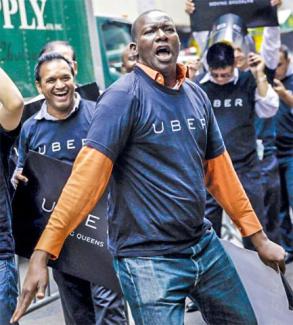UNION LITE
Unusual UFCW deal with Uber sparks debate on best way to unionize

CAN YOU TRUST the boss to help you unionize? The UFCW (United Food and Commercial Workers) is betting you can.
A new deal between the union and Uber Canada will give more than 100,000 drivers and delivery couriers in Canada union representation—but strictly limited to when contesting issues related to their account status, such as deactivation, with the Silicon Valley tech giant.
Both sides hailed the unusual agreement as a “historic” positive step toward achieving “common ground” in a long-standing debate over the employment classification of gig economy workers.
But others are not so certain.
Reasonable doubts
Labour lawyer David Doorey says until the full agreement is disclosed, workers may have “reasonable suspicions” about the deal.
Other advocates for gig workers say the agreement does very little to move the needle on issues such as minimum wage, vacation pay and health benefits, which employees are entitled to, but contractors are not. Other unions, such as Gig Workers United, have been pushing for employee status and those benefits for years.
“In fact, it seems like this is a half-measure which could prevent full unionization and counter the efforts to reclassify Uber workers as employees,” said Andrew Monkhouse, a prominent Toronto-based labour and employment lawyer.
Paul Meinema, national president of UFCW Canada, sees it differently. He says, “This is the first step in a long process. Of course there is a lot of work to be done, but we think it is a good start to increasing and enhancing standards for Uber workers,”.
Fig leaf for Uber
But Gig Workers United (GWU), a community-based union backed by CUPW (the Canadian Union of Postal Workers) that is fighting for the reclassification of all gig economy workers across the country, says the agreement does little to give gig workers what they need most—namely, full recognition as employees and not independent contractors.
“What this does is it enshrines Uber’s current business model, under the progressive guise of allowing its workers to unionize,” said Jennifer Scott, an Uber Eats delivery courier and president of Gig Workers United. Scott said that the agreement between UFCW and Uber caught Gig Workers United by surprise, even though both unions have worked alongside the Ontario Federation of Labour to push for full employee status for gig workers.
The agreement commits UFCW to work together with Uber to “press provincial governments” for “industry-wide legislative standards—like minimum earnings standard, a benefits fund, and access to workers’ rights—across the country.”
The GWU says this sounds awfully similar to Uber’s Flexible Work+ plan released in 2021. Flexible Work+ called on provincial governments to pass legislation entrenching the legal fiction of Uber workers as “independent contractor”.
Unions—inclucing the UFCW—attacked Flexible Work+ as an effort to exclude gig workers from the same rights as other workers. In March 2021, UFCW Canada released a statement condemning Uber’s Flexible Work+ plan.
Employers can’t pick sides
Labour lawyer Dave Doorey points out, UFCW has signed a kind of a “neutrality agreement” whereby Uber recognizes UFCW in some limited capacity. It is reasonable to assume UFCW plans to translate representation of Uber workers into card signing, certifications, and dues money.
In fact, the agreement might violate labour law, Doorey notes: “the question arises whether it is unlawful for Uber to enter into an agreement with UFCW that gives the UFCW special rights that are not equally available to CUPW [which supports GWU].
“This adds a wrinkle because Canadian labour laws prohibit employers from participating in or interfering in the selection and administration of a union or from giving preference to a particular union .... This law is there to ensure that an employer does not get involved in urging its employees to select one union over another. It’s none of the employer’s business which union employees select.”
History is not on UFCW’s side. Other unions have tried similar arrangements with employers to ease the way to union certification. None worked.
There is no easy shortcut to building union power says GWU Vice President Brice Sopher.
“We’re out there all the time. We’re talking to people, we’re doing outreach—that’s the essential part of union work. It’s not supposed to be easy. That’s why it’s been a long struggle for us, because the hard way is the right way.”
- 30 -













Add new comment